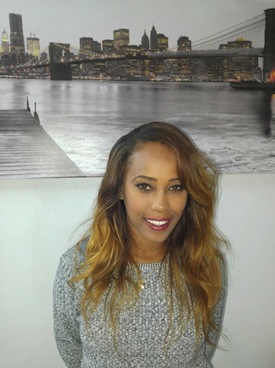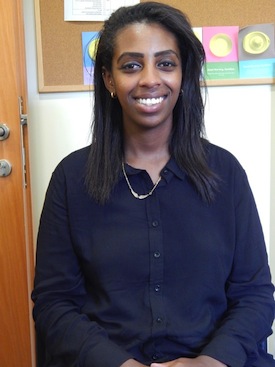Jewish Federation of Greater Vancouver and the local Jewish community recently hosted Ethiopian-Israeli students Mazal Menashe and Ahuva Tsegaye. (photo by Cynthia Ramsay)
Every second year, the Jewish Federation of Greater Vancouver hosts two Ethiopian students from the Interdisciplinary Centre in Herzliya. This allows the students to come to Canada and intern in their chosen fields, giving them not only the educational experience but an advantage in finding work after graduation. The students also act as ambassadors for Israel while in the community and interacting with various local groups.
This year, Federation hosted Mazal Menashe and Ahuva Tsegaye. While in Vancouver for the month-long internship, the students stayed with host families Sam and Sandra Reich in Richmond and Ben and Nancy Goldberg in Vancouver; they spoke at synagogues, churches and schools.

In 1991, when Operation Solomon airlifted 14,325 Ethiopian Jews to Israel in 36 hours, Menashe and Tsegaye were babies. Tsegaye’s mother, who was a midwife, gave birth to her alone on the way to Addis Ababa for the airlift, on the outskirts of Gondar. Menashe, granddaughter of Qes (Ethiopian for rabbi) Menasse Zimru, was born in Addis Ababa while her mother and father awaited the Israelis.
Menashe and Tsegaye both grew up in Israel, overcoming poverty and occasional racism to become successful young women.
Upon arriving in Israel, Tsegaye’s family lived first in Jerusalem, then Haifa, then Kfar Hahoresh in the north and, finally, Migdal Haemek, where they still live today. Her mother is a homemaker, and her father, who works for the city as a street cleaner, is now semi-retired.
Menashe’s family first moved to an absorption centre in Mabu’im in the south, near Beersheva. They lived there for a year before moving to Netivot, where they stayed until Menashe was 6, and then to Ashdod, where they live today. Her mother is a caregiver for the elderly and her father works in a factory.
Both Menashe and Tsegaye served in the Israel Defence Forces.
Menashe was drafted to the IDF in 2010, and completed training in the Logistics Corps as an outstanding soldier. After serving in the Paratroopers Brigade for two months, she was asked to go into officers’ training, which she did, becoming responsible for a company of 150 soldiers. When she was released from the army after five years, it was with the rank of lieutenant.
Tsegaye served for six and a half years, the only member of her family to become an officer. She served in an air traffic control unit in the air force as an instructional officer, and completed her service with the rank of captain.
“Serving in the IDF was the most empowering experience of my life,” said Tsegaye. Menashe agreed.

Menashe and Tsegaye didn’t meet in the IDF, but rather at the Interdisciplinary Centre, where they are both enrolled. In August, Jewish Federation brought them to Vancouver to work as interns in their respective fields: Menashe in law and Tsegaye in organizational psychology.
“We feel so blessed, so appreciative for what the Jewish Federation has done for us,” said Tsegaye. “And we are very grateful to have the platform to be advocates for Israel abroad.”
Both Menashe and Tsegaye have faced many challenges to get where they are now. Ethiopians in Israel face racism, poverty and challenges related to cultural and linguistic integration. The two students were both present at the mass protests that took place in Tel Aviv and Jerusalem last year calling for an end to racism and police brutality against Ethiopian-Israelis.
Menashe and Tsegaye broadcast strength and optimism. “We cannot wait for other people to save us,” they agreed. “We are not waiting for a savior, we will work hard and make the change ourselves.”
The power to shape their own lives, and their optimism about their ability to make the lives they want, are recurring themes in Menashe and Tsegaye’s conversation. This is fitting for members of the generation that is changing the realities of Ethiopian-Israeli life in Israel. “Our generation is entering the professional classes,” noted Menashe. “We are making a new future for Ethiopian-Israelis.”
Tsegaye added that the younger generation of Ethiopian-Israelis gives her hope. She told of going to a kindergarten where a nephew is enrolled and seeing a black doll. “I had never seen a black doll before in my entire life,” she said. “The younger Ethiopian-Israelis are much more integrated. They see themselves as Israelis.”
For community members wanting to support Jewish Federation programs such as this one, the annual campaign runs to Nov. 30. For more information, visit jewishvancouver.com.
Matthew Gindin is a freelance journalist, writer and lecturer. He writes regularly for the Forward and All That Is Interesting, and has been published in Religion Dispatches, Situate Magazine, Tikkun and elsewhere. He can be found on Medium and Twitter.

